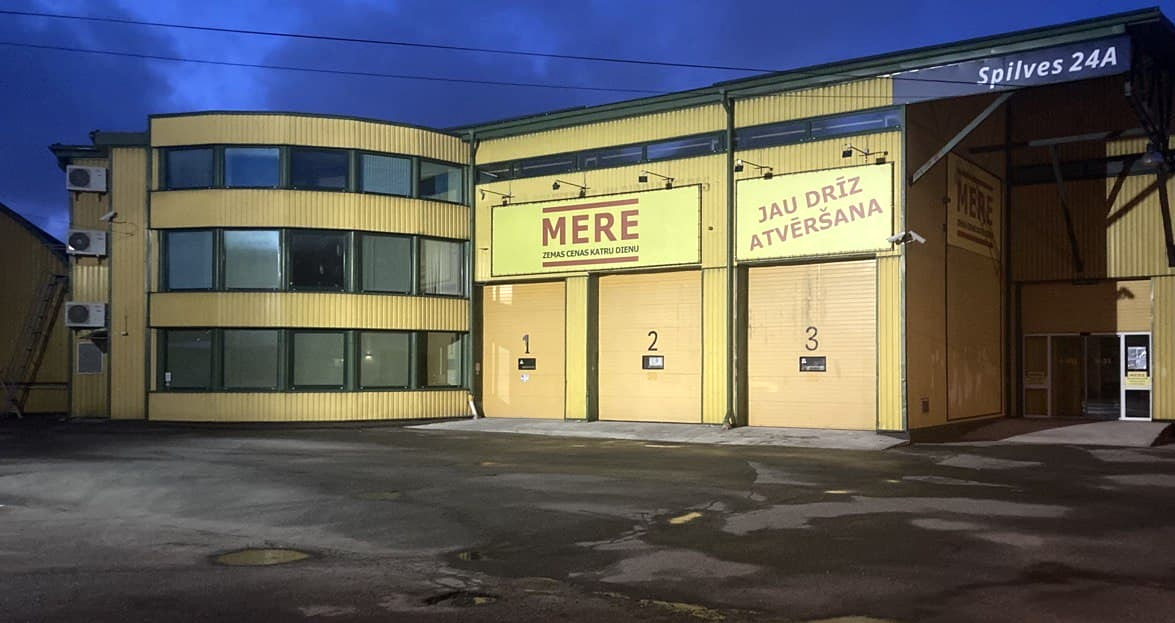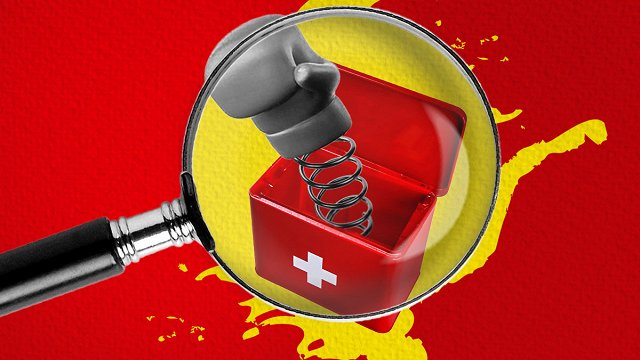“Mere” is owned by entrepreneurs from Russia who have a large network of shops under the “Svetofor” (“Светофор”) banner.
“Opening soon,” reads a large yellow sign outside a hangar on the outskirts of Iļģuciems. It will be the first “Mere” store in Rīga and also in Latvia. There are already nine shops in neighboring Lithuania.
A “dark horse” from Siberia
The owners are a group of businessmen from the Siberian town of Krasnoyarsk. Since 2009, they have been developing a network of hard-discount shops called “Svetofor”. The majority is owned by the brothers Sergey and Andrey Schneiders (Сергей и Андрей Шнайдеры). They also control 73% of the shares of “Mere” operator in Latvia SIA “Latprodukti” – this company was registered in May last year. As the media have observed numerous times, the owners of “Mere” and “Svetofor” are private people, never giving interviews or answering journalists' questions.
Despite the image of a “dark horse”, in 11 years the network has grown from one store in Siberia to more than 2,000 stores in Russia, China, Belarus, Kazakhstan. In the past three years, the company branded “Mere” has been trying to expand operations in European Union markets. In Russia, the company is in the top ten of the largest food retailers.
In neighboring Lithuania, the first “Mere” shop was opened last June on the outskirts of Kaunas. Management then announced plans to open 40 stores. Customer feedback and media reviews in all the countries where the network has started to operate provide some similar characteristics – the premises are rather like an unattractive warehouse (in the company itself it is called “minimalist ascetic design”), the goods are placed directly on pallets or mechanical scaffolding shelves, and prices are about 20% lower than competitors', according to Deutsche Welle's description, “coffee for €1.97 and it's drinkable”.
According to surveys of customers of Mere on YouTube, the products are mostly from unknown producers (Poland, other countries of Eastern Europe, Turkey), but there is also something from local products: meat products, sausages from Lithuania, while products from Latvia are spotted in the juice section (“Cido”) and canned fish. Household items are mainly manufactured in Russia.
In Germany, several “Mere” stores opened in 2019. They initially caused a stir in the German media, and some of them called the new player the “Russian Aldi” (a large network of German low-price shops) and drew attention to the low prices. At the time, management announced plans to expand to 100 stores, but the latest news from Germany, the third open shop, is dated May last year. Since then, the continued expansion in this market hasn't been heard. The company's website does not specify the number of shops in each country, but names only countries: Romania, Poland, Lithuania, Germany.
One store may not be enough
“I don't really believe this is serious,” Henriks Danusēvičs, head of the Latvian Traders Association, said about the entry of “Mere” in Latvia.
“Yeah, they have a simple format and low prices. However, I don't feel power there. The German media has written a lot because it is this Russian network, and it is exotic for Europe. But if they opened only three stores in Poland in three years – it's very, very slow. However, Poland is a much wider and more important market compared to Latvia. They take some steps, slow, researching, but I don't see active development. Moreover, it should be noted that Lidl will be opened sometime in Latvia. For the time being, I don't see the perspective here for Mere. If only buy another network.”
The Russian citizen Anton Sarychev, who is the director of development for Svetofor and a member of the board of the Latvian operator SIA Latprodukti, compared the situation in Latvia to what is in Lithuania: “I personally do not work with the Polish market, so I cannot comment on it. But look at Lithuania – there are already nine of our stores. So we have no questions about whether we will develop in Latvia.”
According to Rus.lsm.lv, at the beginning of March, the company placed advertisements recruiting cashiers (salary: €500 after tax) and an accountant (salary not specified). But in January, the company had been looking for development managers in Latvia, who would have to look for places where shops could be located, to enter into rental agreements, to deal with equipment.
According to Sarychev, the shop in Iļģuciems will be opened in mid-March. He did not answer how many stores have currently been planned.
There are no hard-discount shops in Latvia at the moment, but a network is needed to take place under the sun, Danusēvičs said.
“I don't know why we don't have hard-discount shops, why we closed the previous formats. It looks like Maxima and Lidl are planning to provide low prices in their own way without creating a special type of hard-discount stores, as Mere does, which is almost like a wholesale warehouse and a minimal number of employees. But one open shop makes no difference yet. We saw that even Prisma, with five big stores, couldn't keep up here.
“In terms of low-end shops in Latvia – at least ten shops are needed to compete seriously. But for the time being, I don't see such activity. Maybe they have a different situation in Lithuania. But there is a different market: Lithuania does not have the same cooperation as we do in the group of small traders. They have the big networks, but as for the small ones, there is only one [network of cooperation] Aibe. There's more freedom for the smaller ones.”
Leaders and Cooperation
In the past, the Rimi chain had its own hard-discount store network Supernetto. But in 2018, the company's management waived this approach, and 38 shops turned into “Rimi Mini.” According to Latvian food producers, large commercial networks have chosen their way of fighting for the “frugal customer”, and instead of individual low-end shops, develop their own “private label” segment, whose goods can be found in any network shop. Rimi has the Basic line, whereas Maxima has Optima Līnija
Both networks have been market leaders for many years. The turnover of “Rimi Latvia” (132 mini, super and hypermarkets) was EUR 917 million in 2019, with a profit of EUR 33 million. Maxima Latvija (173 stores, three formats) turnover amounted to €837 million in the same year and profit of €27 million. Local small and medium-sized retailers cooperate by developing shop networks “Lats”, “top!”, “Citro”, “Elvi” and “Aibe”. For example, one of the richest businessmen in Latvia is trade veteran Egils Butka, who controls more than a hundred “top!” shops, which worked with a turnover of €151 million in 2019.































